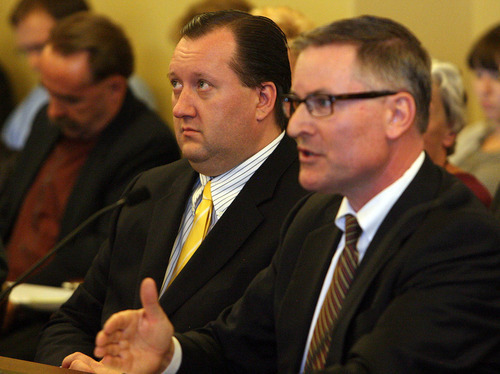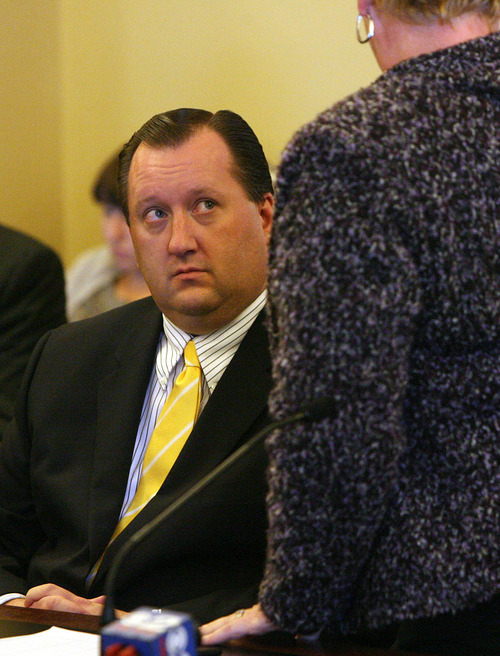This is an archived article that was published on sltrib.com in 2011, and information in the article may be outdated. It is provided only for personal research purposes and may not be reprinted.
Will McCarvill had not been active in government, but when he learned of a proposed development in Cottonwood Heights that might obstruct his views of Big and Little Cottonwood canyons, McCarvill became concerned.
The semi-retired aerospace construction consultant who is now president of CHVoters Inc. began monitoring Cottonwood Heights government by filing requests under the Utah Government Records Access and Management Act (GRAMA). The law makes government records available to the public unless there's a statute expressly stating otherwise.
"I think that without that tool, a lot of this stuff would not have become visible and the citizens would not realize what is going on with their government," McCarvill said.
Some of that information about government could become off-limits after the Utah Legislature last week passed HB477. Among other things, it would exempt the Legislature from much of GRAMA, would allow other government agencies to charge more for fees and would categorically prohibit the release of government text messages and instant messaging. The bill awaits the signature of Gov. Gary Herbert.
GRAMA and other public-record laws are often portrayed as benefiting journalists. Rep. Neal Hendrickson, D-West Valley City, in a floor debate Thursday suggested reporters sought to "dig up some dirt on" politicians.
But research has suggested record laws more often benefit other groups of citizens.
A 2001 report by the Heritage Foundation found journalists submitted only 5 percent of federal Freedom of Information Act requests received by selected agencies. A 2006 report from the Coalition of Journalists for Open Government placed the number at 6 percent.
A 2009 analysis of FOIA requests in the United Kingdom found journalists accounted for 14.3 percent of requests. There's no published research in Utah about who uses GRAMA.
"Journalists just aren't the main user of public records," David Cuillier, an associate professor at the University of Arizona who studies freedom of information, said in an e-mail. "The biggest category of user is commercial — public records make this economic machine run. Lawyers, title companies, contractors, you name it."
In addition to companies, a wide variety of individual Utah residents use GRAMA to access records for concerns over charter schools or water rights.
"This is not a media issue. This is an issue for the citizens of Utah who need access to government information in order to make informed decisions about how their government should operate," said Sherilyn Bennion, the co-legislative director for the Utah League of Women Voters.
For Dan Stephens, a Salt Lake City resident who owns property near Wendover, GRAMA requests helped him get information on where the water on his land in western Utah was going.
"It's the only way for it to be a fair fight," Stephens said. "GRAMA has been really helpful to me. I just love the hell out of it."
Jamie Renda of Ogden filed several GRAMA requests when she found out her daughter's charter school hadn't filed required foundation documents. She said she understands legislators' concerns about keeping their private lives private, but believes public business should be made public.
"Anything not protected under open meeting laws should not be protected under this law," Renda said. "If you have a specific concern you're researching, you should be able to access anything that led to those deliberations."
One of the biggest potential barriers to access will be an increase in costs for accessing state records. Currently, those who request public records are responsible for paying direct administrative costs. Under the new bill, requesters would be responsible for administration and undefined "overhead costs."
"They're just putting stumbling blocks in the way of getting information," said Chance Williams, a former city councilman for Woodland Hills who has filed GRAMA requests on a variety of issues. "When we can't get access to information easily, that's a red flag that something's being hidden."
Since its monitoring of Cottonwood Heights began, CHVoters has used GRAMA to investigate the proposal to construct a 12-story building near the canyons and to create a community development agency that CHVoters believes would lose money for taxpayers. Some of those requests sought correspondence between developers and city personnel.
"Sometimes you're not sure what is going on so you don't know how to ask very specific questions," McCarvill said. "But when you get the sum total of an e-mail trail, you start to understand."
McCarvill estimated his organization has been billed "hundreds and hundreds" of dollars for the records. He fears fees would increase and other obstacles would mount under HB477.
"It's clearly aimed at making government activities less transparent," McCarvill said.
Matt Pacenza, policy director for the nonprofit organization HEAL Utah, said lawmakers seem to be under the impression that nonprofits like his have unlimited funds to pay for GRAMA requests, which help his watchdog group oversee companies such as EnergySolutions.
"We understand it's appropriate to charge us for various costs, but these new fees may keep us from doing what we think is an important mission — monitoring radiation in the state and protecting the public health and the environment," Pacenza said.
Rep. Chris Herrod, R-Provo, faced a situation last year in which the Salt Lake City Police Department wanted to charge him more than $10,000 for thousands of records detailing undocumented immigrant arrests. He unsuccessfully fought the fees, and eventually had to narrow his request to lower the expense. But he voted for HB477, saying he is working to balance the cost to the taxpayer for a "fishing expedition."
His concern primarily rests in protecting his privacy as a legislator, he said.
"I don't want a text message I send to my wife saying 'I love you' to be a public record," he said. But he acknowledges that the restriction gets "blurry" when a text message from the head of a government department to a legislator discussing state business is no longer considered a public record.
Some residents take a stronger stance about the new restrictions.
"It's like Egypt shutting down the Internet," said Roger Kehr of Cottonwood Heights, who has filed several GRAMA requests regarding the Utah Transit Authority and its financial relationship with municipal and state leaders. "It's the government trying to work in opposition to the people they represent. If we stand by and let them get away with it, who knows?"
Voting on HB477
Utah House
Yeas (61) • Johnny Anderson, Roger Barrus, Jim Bird, Derek Brown, Mel Brown, David Butterfield, LaVar Christensen, David Clark, Fred Cox, Brad Daw, Brad Dee, John Dougall, Jack Draxler, Jim Dunnigan, Rebecca Edwards, Steve Eliason, Julie Fisher, Gage Froerer, Brad Galvez, Francis Gibson, Richard Greenwood, Keith Grover, Stephen Handy, Wayne Harper, Lynn Hemingway, Neal Hendrickson, Chris Herrod, Greg Hughes, Eric Hutchings, Don Ipson, Ken Ivory, Todd Kiser, Brad Last, Becky Lockhart, John Mathis, Kay McIff, Ronda Rudd Menlove, Michael Morley, Merlynn Newbold, Jim Nielson, Mike Noel, Curtis Oda, Patrick Painter, Lee Perry, Jeremy Peterson, Val Peterson, Dixon Pitcher, Kraig Powell, Paul Ray, Holly Richardson, Douglas Sagers, Stephen Sandstrom, Dean Sanpei, Kenneth Sumsion, Evan Vickers, Curt Webb, Mark Wheatley, Ryan Wilcox, Larry Wiley, Brad Wilson, Carl Wimmer
Nays (12) • Patrice Arent, Jackie Biskupski, Joel Briscoe, Rebecca Chavez-Houck, Tim Cosgrove, Janice Fisher, Brian King, David Litvack, Carol Moss, Marie Poulson, Jennifer Seelig, Christine Watkins
Absent or not voting (2) • Susan Duckworth, Bill Wright
Utah Senate
Yeas (21) • Stuart Adams, Curt Bramble, Allen Christensen, Gene Davis, Margaret Dayton, Lyle Hillyard, David Hinkins, Scott Jenkins, Peter Knudson, Dan Liljenquist, Mark Madsen, Wayne Niederhauser, Ralph Okerlund, Stuart Reid, Howard Stephenson, Jerry Stevenson, Daniel Thatcher, Stephen Urquhart, John Valentine, Kevin Van Tassell, Michael Waddoups
Nays (7) • Chris Buttars, Pat Jones, Karen Mayne, Ben McAdams, Karen Morgan, Luz Robles, Ross Romero
Absent (1) • Dennis Stowell





